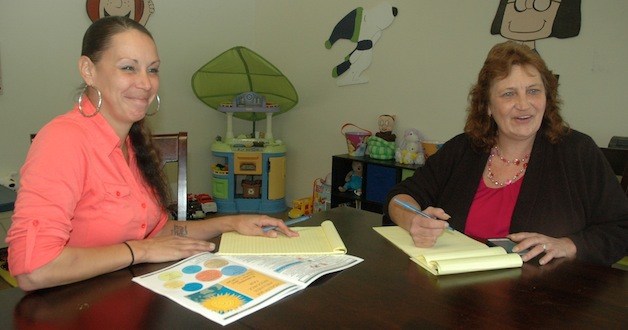SMOKEY POINT — Although the Arlington Community Resource Center’s opening was more than a year after the Oso slide, it had been planned for at least a year before the tragedy.
Sue Weiss, an advisory committee member, recalled how the disaster made people more aware of the needs that were already unmet in the area, while Seanna Herring-Jensen, its program manager, noted how careful the center was in choosing its partners.
“We wanted to make sure they represented our community well,” Herring-Jensen said, adding that, although Lutheran Community Services Northwest is behind the center, there would be “no proselytizing.”
“We’re not limiting it by age, groups or services,” Weiss agreed. “We’re here to be a clearinghouse. We’re centrally located within the community, here at the Stillaguamish Senior Center, and we serve multiple needs at once, so we’re a one-stop shop.”
Herring-Jensen explained that the center has conducted listening sessions to identify needs.
“There are gaps in service,” Herring-Jensen said. “There are certain services that aren’t making their way out here, and that’s a problem for folks who don’t have a car, or can’t reach those services by bus.”
Herring-Jensen identified housing, employment, food and transportation as the top priorities.
“Homelessness is a huge problem, but so much of that owes to a lack of affordable housing in the county,” Herring-Jensen said. “Housing, emergency shelters and detox beds are all areas the county is responsible for, but we can provide them with feedback that emphasizes that degree of need.”
The center will need to reapply for most of its funding grants annually.
“We don’t have the money to pay your rent, but what we can provide is some creative financing,” Herring-Jensen said.
Herring-Jensen, two full-time staff and a volunteer work there, but it’s still looking to fill another full-time and a part-time position.
“We’re looking for people who have worked with the community, have compassionate hearts, and are bilingual, preferably in Spanish,” Herring-Jensen said.
Weiss pointed out that affordable housing is a pressing issue for seniors on fixed incomes, and people who would otherwise be eligible for food bank services.
“If they don’t have an address, they can’t sign up to get food,” Weiss said.
Herring-Jensen reported that the center recently helped two senior women with their housing situation by matching them as roommates.
Weiss deemed teenagers to be among the most avid employment-seekers she’s met.
“That’s where we’re hoping for some help from our local businesses,” Weiss said.
Herring-Jensen elaborated that too many teens fall into a gap of foster care coverage, and find themselves couch-surfing to avoid homelessness.
“These kids are not moochers,” Herring-Jensen said. “They want jobs. They want to work. They want to support themselves, because they don’t want to wind up out on the streets.”
The center is working with local school districts, Boys & Girls Clubs, Youth Dynamics, Cocoon House and the Department of Social and Health Services, as there aren’t enough foster families.
“It’s not just teens,” Herring-Jensen said. “Almost all of the support groups that were asked for during our listening sessions were for parents. We’re trying to keep families together, and if you have parents who are in recovery for substance abuse, that can be difficult.”
Herring-Jensen asserted that homelessness often stems from health and income issues.
“People who can’t afford to pay the rent because of their health conditions account for probably half of the housing cases that we see,” Herring-Jensen said. “Rent in this area is high enough that many people can’t afford it even if they have jobs.”
The center’s services include mental health. Herring-Jensen, who had previously worked with military veterans who were dealing with trauma, pledged to continue doing so at the center, which is also open to all those affected by the Oso slide.
“It doesn’t just have to be first responders,” Herring-Jensen said. “Even if you just helped dig through the dirt, that can make an impact, and it can take a while.”
Herring-Jensen expects the center will eventually have a counselor.
Another prospective program is a needle exchange.
“By picking up dirty needles, the people who come in will be preventing the spread of diseases,” Herring-Jensen said. “They would just keep on using those dirty needles otherwise. Meanwhile, we’re getting them tested and talking to social workers.”
“It familiarizes them with our services, so that when they’re ready, they can come talk to us,” Weiss said.
The center’s next listening session is slated for 7 p.m. on Thursday, Nov. 5, at the Arlington Boys & Girls Club, at 18513 59th Ave. NE.
For details, contact Herring-Jensen at 360-386-7989 or email sjensen@lcsnw.org. The center is at 18308 Smokey Point Blvd. in Arlington.







